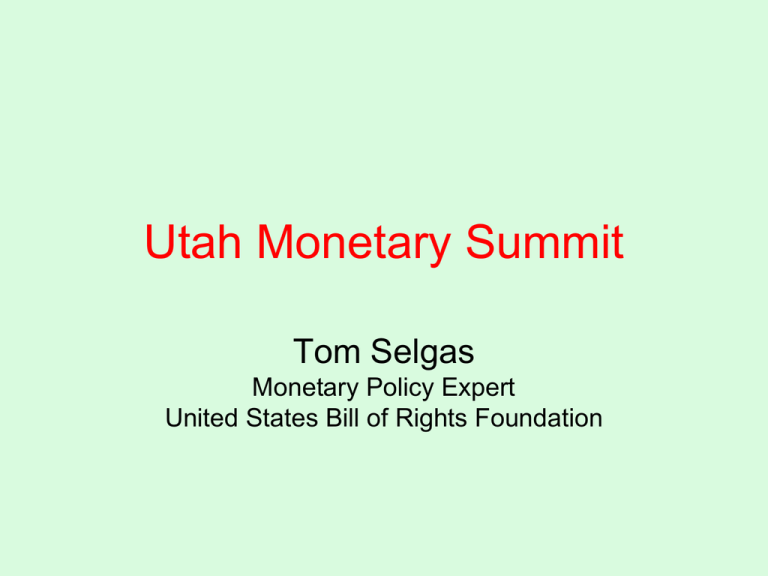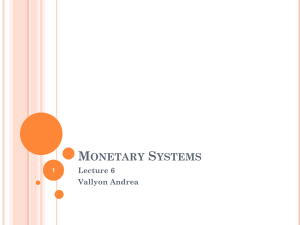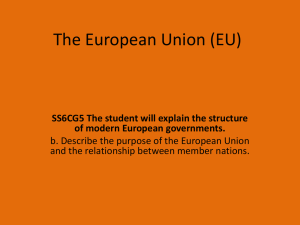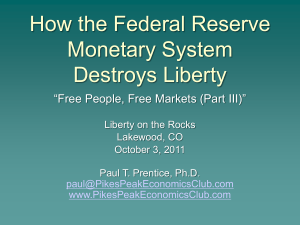Utah_Money_Summit
advertisement

Utah Monetary Summit Tom Selgas Monetary Policy Expert United States Bill of Rights Foundation Acknowledgements • • • • Dr. Edwin Vieira, Jr., PhD, J.D. Bernard Lietaer James Turk Dr. Larry Parks, PhD Why are we here? • We see the end of the latest era of Fiat Currency – Debt does not produce value or savings it produces chaos; • We see the end of Western Civilization – Economic collapse, political upheavals, and massive civil unrest • We see the need for an Alternate Currency – Our founders understood the necessity of alternate currency’s and allowed the states to use any gold and silver coin [or bullion, see Bronson v. Rodes, 74 US 229, 245-246] (1869) as tender in payments of debt. Three Key Points 1. There is a structural cause to the ongoing financial crisis 2. Growing unemployment is a consequence 3. A structural solution is available to solve these problems now and into the future Evidence for Structural Cause? • This is the biggest, but not the first crisis • In the last 25 years (source World Bank) – 96 previous banking crises – 176 monetary crises Complexity Theory • Breakthrough: Sustainability is measurable with a single metric –The optimal balance between “efficiency” and “resilience”. Balance in Natural Networks Resilience Efficiency (In) Balance in Our Financial Network Efficiency Resilience Complex Networks • Efficiency and Resilience are functions of 2 structural variables: diversity and interconnectivity • They are independent from what is being processed in network – – – – Biomass in an ecosystem Electrons in electrical circuit Information in immune system Money in an economy … Structural Solution • Alternative currencies structurally diversify our medium of exchange – provide for greater resilience • Alternative currency = a standard medium that circulates in parallel with nationalistic or “conventional” money – Examples: Theme park tokens and script (Disney Dollars) circulate within a community. – Alternative currencies link unmet needs with unused resources “Usefulness” of Alternative Currency • Fact: 70-90% of private employment is generated by Small and Medium sized Businesses • Problem: – Small and medium sized businesses are pressured to pay quickly (e.g. 30 days) – But get paid slowly (e.g. +90 days) – Banks uninterested in providing bridge financing • Solution: – State sanctioned Alternative Currency – Bridge financing using the alternative currency Benefits to the State that implements a Sound Alternative Currency System • Increased capital flow from all over the world • Reduction in unemployment • Increased revenues and fiscal longevity State Policy Makers should recognize • Most cost-effective support for employment by governments: Accept Alternative Currency Units for payment of taxes – Uruguay & Northern Brazil success stories – Produces additional income to governmental entities that accept them. • Alternative Currencies are now where Open Source software and Microfinance were +10 years ago … Choosing the right Alternative Currency • Fiat Legal Tender – Pro: relatively cheap to implement – Con: dishonest, ultimately hyper-inflates • Gold and Silver Coin – Pro: honest, retains value – Con: expensive to implement • Electronic Gold and Silver bullion or coin – Pro: honest, retains value, cheap to implement – Con: requires frequent audits (~quarterly) Facts about Fiat Currency • No currency in history has lasted longer than 42 years after its intrinsic backing has been abandoned. John Tamny, 9/9/20101 – It was 40 years ago (8/15/1971) that President Nixon severed the Federal Reserve Note’s link to gold. • The Continental was America’s first fiat currency and it only lasted 6 years. • The graduated income tax system has allowed modern fiat currencies, such as the Federal Reserve Note, to last ~40+ years 1: http://www.forbes.com/2010/09/07/dollar-currency-gold-standard-2020-opinions-columnists-john-tamny.html What is the effect of using fiat legal tender? Property = # Egg Cartons = # Lawful Money ($) # Legal Tender $ (Brown Eggs) 1957 = = = U.S. Silver Certificate 1,600 Sq. Ft. Home ~37,700 ($)13,500 No Lawful Money Available = 1982 $13,500 Fed. Res. Bank Note 1,600 Sq. Ft. Home 2007 “$85,400” ~37,700 = = = Fed. Res. Bank Note 1,600 Sq. Ft. Home ~37,700 ($)13,500 “$175,000” Fiat Currency Robs Capital! Property = # Egg Cartons = # Lawful Money ($) # Paper Tender $ (Brown Eggs) Buy 1957 = = = U.S. Silver Certificate 1,600 Sq. Ft. Home Sell 2007 ~37,700 = ($)13,500 $13,500 = = Fed. Res. Bank Note 1,600 Sq. Ft. Home ~37,700 ($)13,500 $175,000 No Cartons of Eggs Gain No Lawful Money Gain Federal Reserve Note “Gain” of $161,500 No Gain No Tax Due No Gain No Tax Due Alleged Tax Due ~FRN$55,000 After FRN Tax results in a Physical Egg Carton Loss of 11,922 Cartons of Eggs After FRN Tax results in a Lawful Money Property Loss of ($)4,269 The purported Fiat Currency “Gain” is actually a “quiet theft” in that it results in a physical property loss with the perception of an actual gain. Fiat Currency Results in Quiet Theft! Stock = # Egg Cartons = # Lawful Money $ # Legal Tender $ (Brown Eggs) Buy 1962 = = = U.S. Silver Certificate 4 Shares IBM Stock Sell 2007 $1,942.00 ~5,424 = $1,942.00 = = Fed. Res. Bank Note 300 Shares IBM Stock after splits ~6,571 17% Gain in Eggs Cartons Tax Due ~172 Egg Cartons After FRN Tax results in a Physical Egg Carton Loss of 923 Cartons of Eggs $2,338.56 17% Lawful Money Gain Tax Due $59.48 “$30,501.00” Federal Reserve Note “94% Gain” of $28,559 Alleged Tax Due (15%) ~FRN$4283.85 FRN Inflation results in a 83% tax rate or $328.45 of the $396.56 of the purported gain The purported Paper Tender “Gain” is actually a “quiet theft” in that it results in an 83% tax rate with the perception of 15% tax rate. IBM Stock Splits: 1964-05-18 [5:4], 1966-05-18 [3:2], 1968-04-23 [2:1], May 29, 1973 [5:4], Jun 1, 1979 [4:1], May 28, 1997 [2:1], May 27, 1999 [2:1] The Constitution foresaw the need for Alternative Currency Structural Solution Article I Section 8, Clause 5 [The Congress shall have Power] To coin Money, regulate the Value thereof, and of foreign Coin, and fix the Standard of Weights and Measures; Article I Section 9, Clause 1 … a Tax or duty may be imposed on such Importation, not exceeding ten dollars for each Person. Article I Section 10, Clause 1 No State shall … make any Thing but gold and silver coin a Tender in Payments of Debts. Amendment VII In Suits at common law, where the value in controversy shall exceed twenty dollars, the right of trial by jury shall be preserved, and no fact tried by a jury, shall be otherwise re-examined in any Court of the United States, than according to the rules of the common law. The Supreme Court ruled on the validity of the Structural Solution Bronson v. Rodes, 74 US 229, 245-246 (1869) Payment of money is delivery by the debtor to the creditor of the amount due. A contract to pay a certain number of dollars in gold or silver coins is, therefore, in legal import, nothing else than an agreement to deliver a certain weight of standard gold, to be ascertained by a count of coins, each of which is certified to contain a definite proportion of that weight. It is not distinguishable, as we think, in principle, from a contract to deliver an equal weight of bullion of equal fineness. It is distinguishable, in circumstance, only by the fact that the sufficiency of the amount to be tendered in payment must be ascertained, in the case of bullion, by assay and the scales, while in the case of coin it may be ascertained by count. United States v. Marigold, 50 U.S. 560, 567-568 (1850) “They [Congress] appertain rather to the execution of an important trust invested by the Constitution, and to the obligation to fulfill that trust on the part of the government, namely, the trust and the duty of creating and maintaining a uniform and pure metallic standard of value throughout the Union. The power of coining money and of regulating its value was delegated to Congress by the Constitution for the very purpose, as assigned by the framers of that instrument, of creating and preserving the uniformity and purity of such standard of value The Supreme Court ruled on taxation in the Structural Solution Lane County v. Oregon, 74 US 71, 78 (1869) Hagar v. Reclamation District No. 108, 111 U.S. 701, 706-07 (1884) If, therefore, the condition of any State, in the judgment of its legislature, requires the collection of taxes in kind, that is to say, by the delivery to the proper officers of a certain proportion of products, or in gold and silver bullion, or in gold and silver coin, it is not easy to see upon what principle the national legislature can interfere with the exercise, to that end, of this power, original in the States, and never as yet surrendered. If this be so, it is, certainly a reasonable conclusion that Congress did not intend, by the general terms of the currency acts, to restrain the exercise of this power in the manner shown by the statutes of Oregon. The acts of Congress making the notes of the United States a legal tender do not apply to involuntary contributions exacted by a State, but only to debts, in the strict sense of that term, that is, to obligations for the payment of money founded on contracts, express or implied … First, that it was the right of each State to collect its taxes in such material as it might deem expedient, either in kind, that is to say, by a certain proportion of products, or in bullion, or in coin, the court observing that the extent to which the power of taxation of the State should be exercised, the subjects upon which it should be exercised, and the mode in which it should be exercised were all equally within the discretion of its Legislature, except as restrained by its own constitution and that of the United States Alternative Currency System Requirements • Any alternative currency system requires multiple third party outside auditors • Any alternative currency must be based upon honest weights and measures “to prevent its debasement and expulsion, and the destruction of the general confidence and convenience” • Any alternative currency system cannot be monopolized by a private entity (e.g. The Federal Reserve Banking system) Conclusion for State Lawmakers • The Constitution of the United States authorizes the use of a Gold and Silver based alternative currency system, Article I Section 10, Clause 1 • An Electronic Gold and Silver bullion currency system is constitutionally authorized, Bronson v. Rodes, 74 US 229, 245-246 (1869) • An Electronic Gold and Silver bullion alternative currency system provides the best cost benefits for both the State and her citizens. BACKUP SLIDES Final Remarks • Edwin Vieira, Jr, PhD, J.D.: There is no question that this "banking" (or, more descriptively, "financial racketeering") group has been, for a long time, the dominant economic, political, and social force in Western Civilization, and more recently in world civilization. But the cracks in its facade are already widening to a dangerous degree: Its paper-money and credit schemes are in the final stages of Ponzi self-destruction. Its militaristic imperialism has arrived at the point of "overstretch ." Its "social programs" to keep the masses content with "bread and circuses" are proving too expensive to maintain while funding the other major line-items of the imperialistic agenda. Its political and economic fronts of "democracy," "free elections," "two parties," "the rule of law," "freedom of speech," "free markets," "free trade" et cetera ad nauseum, are being exposed as frauds. So the game seems to be up. http://www.lewrockwell.com/wile/wile30.1.html What are our choices? • We can wait for the people who created the problem to give us their next best solution • We can look to our own history and restore our Constitutional Lawful Money system • We can do nothing and see what happens History show that if we sit back and do nothing we will see the demise of Western Civilization as we know it Facts about Alternative or Dual Currencies • Europe had dual currency systems during the late medieval and early Renaissance period. • Modern Europe demonstrated that it is possible to run dual currency systems for 24-36 months to transition into a new currency.








